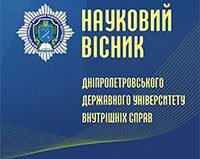Valentin DVORNYK, Roman OPATSKY, Natalya DEVYATKINA, Serhiy KOVALEV
DVORNYK V., OPATSKY R., DEVYATKINA N., KOVALEV S. (2023), MARRIAGE: RETROSPECTIVE REVIEW AND PERSPECTIVES, Scientific Bulletin of Dnipropetrovsk State University of Internal Affairs, № 1, 159-164
DOI: 10.31733/2078-3566-2023-1-159-164
ABSTRACT. The article is devoted to the study of the evolution of marital relations, and an attempt to forecast the further development of this institution.
The author conducted a retrospective analysis of marriage as an institution of society using the historical method of cognition. It was established that the primary form of the studied relationship was promiscuity, that is, unregulated chaotic relationships that were based only on instincts. The further development of the institution of marriage directly depended on the economic development of society (polygamy, polyandry) and religious beliefs.
It has been established that currently marriage is a fairly researched legal category. Scientists have highlighted the main features: it is a voluntary union of two people. Thus, in the event of the death of one of the members, the marriage automatically ceases to exist.; a mandatory condition of this union is that the persons belong to different sexes; concluding a marriage involves the creation of a family, that is, the birth and joint upbringing of children; no regulatory act provides for the terms for which the marriage is concluded, and therefore this union can be considered indefinite; marriage union is voluntary. No one can be forced into marriage or forced to stay in it; marriage is an equal union of two equal people.
Today, the process of transformation of marital relations has not stopped and continues to evolve together with social relations. Now, marriage is not a stable union of a man and a woman, as the final choice for a lifetime to create a family, give birth and raise children. Rather, it is a contracted union of a man and a woman to satisfy their own spiritual, cultural and emotional interests for a period of their complete satisfaction. A similar trend, in our opinion, will continue in the future with the gradual legalization of same-sex marriages. Marriage itself will be a temporary union of two people aimed at achieving common interests and satisfying cultural and emotional needs.
Keywords: marriage, family, family union, signs of marriage, state registration of marriage.
- References:
- Kravchenko, N., Pavlenko, Yu. (1992) Komentar do pratsi «Pokhodzhennia ukrainskoho narodu» [Commentary on the work «The Origin of the Ukrainian People»] / Petrov, V. Pokhodzhennia ukrainskoho narodu. Kyiv, pp. 119–120. [in Ukr.].
- Ukhal, M. M. (2008) Latynsko-ukrainskyi ta ukrainsko-latynskyi slovnyk yurydychnoi frazeolohii [Latin-Ukrainian and Ukrainian-Latin dictionary of legal phraseology]. Mukachevo : «Karpatska Vezha». 436 р. [in Ukr.].
- Kliapets, O. Ya. Osobystist v istorychnii dynamitsi shliubno-simeinykh stosunkiv [Personality in the historical dynamics of marital and family relations]. URL: https://core.ac.uk/download/pdf/32308211.pdf. [in Ukr.].
- Feminizm u Frantsii: khvyli borotby ta emansypatsii zhinok [Feminism in France: waves of struggle and emancipation of women]. Hender v detaliakh. URL: https://genderindetail.org.ua/season topic/feminism-in-detail/feminism-in-france.html. [in Ukr.].
- Simeinyi kodeks Ukrainy [Family Code of Ukraine] vid 10.01.2002. URL : https://zakon.rada.gov.ua/laws/show/2947-14#Text. [in Ukr.].
- Shymon, S. I. (2015) Pravovi oznaky shliubu za simeinym zakonodavstvom Ukrainy [Legal signs of marriage according to the family legislation of Ukraine]. Visnyk Zaporizkoho natsionalnoho universytetu. № 3. Р. 39–44. [in Ukr.].
- Shliub ta simia: poniattia, sutnist, typolohiia [Marriage and family: concept, essence, typology]. URL : https://pidru4niki.com/18540516/sotsiologiya/shlyub_simya_ponyattya_ sutnist_tipologiya. [in Ukr.].
- 9 vrazhaiuchykh faktiv pro cholovikiv [9 amazing facts about men]. URL : https://1plus1.ua/novyny/6-vrazaucih-faktiv-pro-colovikiv. [in Ukr.].
- До трети мужчин в россии растят чужих детей и не знают об этом. URL : https://news.ru/society/chuzhie-deti-semya/.
- Opatskyi, R. (2022) Administratyvno-pravovyi aspekt vstanovlennia batkivstva: novi perspektyvy [Administrative and legal aspects of establishing paternity: new perspectives]. Naukovyi visnyk Dnipropetrovskoho derzhavnoho universytetu vnutrishnikh sprav. № 4. Р. 157–161. [in Ukr.].
- Chomu v Ukraini kozhna druha podruzhnia para rozluchaietsia? [Why does every second married couple divorce in Ukraine?]. Radio Svoboda. URL : https://www.radiosvoboda.org/a/25016301.html. [in Ukr.].
- Advokat Artem Afian: Odnostatevyi seks ye, yoho nikhto zaboronyty ne mozhe. Ne bachu serioznykh arhumentiv proty odnostatevoho shliubu [Lawyer Artem Afyan: Same-sex sex exists, no one can prohibit it. I do not see any serious arguments against same-sex marriage]. UNIAN : informatsiine ahentstvo. URL : https://www.unian.ua/society/advokat-artem-afyan-odnostateviy-seks-ye-yogo-nihtozaboroniti-ne-mozhe-ne-bachu-seryoznih-argumentiv-proti-odnostatevogo-shlyubu-novini-ukrajini 11223458.html. [in Ukr.].
